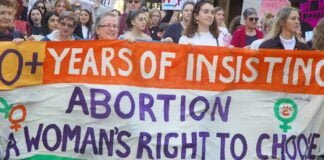Review: The Racket
By Gideon Haigh, Melbourne University Publishing, $34.95
WHILE NEW legislation to decriminalise abortion is debated in the Victorian parliament, influential priests and some politicians continue their crusade to prevent women exercising what should be a right to control their fertility.
Even though tens of thousands of women undergo abortions legally and safely each year and more than 80 per cent of Australians support a woman’s right to choose (including 72 per cent of Catholics), abortion is still an offence on state criminal codes.
Abortions are currently allowed because of an interpretation of the law, known as the Menhennit ruling of 1969 in Victoria. Until then, anti-abortion laws denied women those rights reinforcing women’s inequality; and also created an environment for graft and police corruption, because abortion is a necessity in many cases.
Thousands of women died while a minority grew wealthy, and “respectable” people hushed it up. Most people would be horrified if Australia returned to the days of illegal abortions, the subject of an excellent new book, The Racket, by Gideon Haigh.
This book exposes the lucrative abortion racket which involved a network of greedy backyard abortionists and corrupt police at the highest level, and it traces the road to legal relaxation in 1969.
Haigh explains that an abortion is a simple procedure when the appropriate equipment and expertise are present. Outlawing the practice forced women to rely on the backyard abortionist or to try do-it-yourself procedures using coathangers and various chemicals, and many did.
In pre-1970s Australia, the worst thing for a Christian woman was to be an “unmarried mother”. If parents didn’t help you, certainly the state wouldn’t. The second worst thing was to be pregnant with your seventh child, knowing poverty stopped you from looking after even four, married or not.
So, there was no “free choice” for these women because, in effect, society did not want to provide for that baby. And yet contraception was hardly heard of, expensive and difficult to obtain, while abortion was illegal and unsafe.
Enter the racketeers. The demand for abortion encouraged certain doctors and midwifes to establish backyard practices worth heaps of cash. Even GPs were earning on average 20 per cent in kickbacks. It was perfect for a system of police protection, similar to the drug trade today. Haigh’s documentation is very detailed and thorough, including accounts by the participants.
One woman benefited from an illegal abortion in more ways than one, setting up a service that co-ordinated corrupt police, doctors and patients in the ‘50s and ‘60s. While doctors were arrested and went to court, their lawyers eased their pain, unlike the women who, if arrested, relived their ordeal again and again.
Illegal conditions made it dangerous for women because of the poor techniques and complications like infection and unsafe anaesthetic procedures used by doctors who didn’t care. The doctors learnt to rely on public hospitals to clean up their mess or hide dead bodies in Melbourne’s backstreets.
The worst times were during the 1930s depression, which “pushed Australia’s birthrates to their lowest levels in history… abortion-related admissions to the Women’s Hospital soared. Of the more than 3000 women admitted in 1933 and 1934, 22 per cent were infected, and not quite 2 per cent died.”
Haigh’s story will help you understand the cruel realities facing women in the so-called freedom-loving West, as well as the class divide among women. For this is a story of poor women without money and social connections whose lives would have been totally ruined by unwanted pregnancies.
Haigh doesn’t show show how post-war economic and political changes and important social struggles led to changes in ideas, attitudes and the law. He focuses on the efforts of individuals such as Bertram Wainer, and while their contributions were undoubtedly important, we are left with an analysis based on brave and good individuals fighting against the bad.
Nevertheless, The Racket is a great read and a reminder that women need access to safe abortion funded by Medicare and that such rights are not guaranteed, but must be fought for. As yet another attempt to reduce Medicare funding of abortions goes before federal parliament, defence of women’s rights remains a key task for socialists.
By Judy McVey





